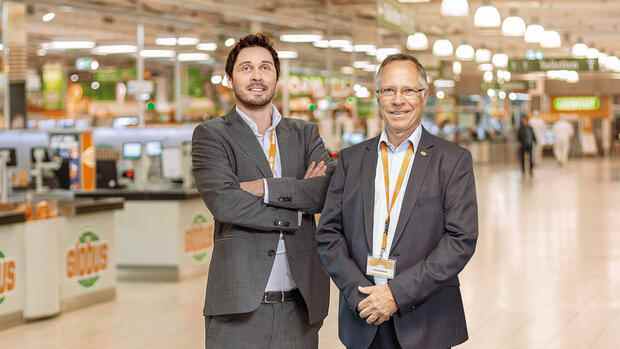Dusseldorf For dealer Thomas Bruch, his commitment in Russia was always more than just a business. The owner of the Globus supermarket chain in Saarland also wanted to use the economic relationship to help smooth the country’s path “from communism to new, democratic structures,” as he once said.
The non-profit Globus Foundation he founded also supports projects in Russia, such as a home for at-risk youth in St. Petersburg. When his wife Graciela, who heads the foundation, was awarded the Dr. Friedrich Joseph Haass Prize by the German-Russian Forum in 2019, she said: “My husband and I care deeply about making a contribution to German- to render Russian friendship.”
Today her son Matthias runs the trading company – and he is in a deep dilemma. Because if he joins the international sanctions against Russia and closes the 19 Globus markets there, he will not only be giving up a billion dollar business. He also jeopardizes the heart of his parents.
“We condemn the war in Ukraine, and the developments of the last few weeks have shocked us a lot,” Matthias Bruch told Handelsblatt. “We are following them with disbelief and great concern.” The company is therefore supporting those affected in a variety of ways with money and donations in kind.
Top jobs of the day
Find the best jobs now and
be notified by email.
But there is also increasing pressure on Globus to go one step further and fundamentally question the business in Russia. The German retail group Obi closed its 27 stores in the country this week. There is no other option for the Obi Group than to cease operations in Russia, she said.
Globus is now – alongside the wholesaler Metro – the last German retailer in the country that is waging a war of aggression against Ukraine. Many international retailers, such as Ikea, Inditex, Hermes and H&M, have now closed their stores there.
Globus feels responsible for its 10,000 employees
But Matthias Bruch is struggling – and not only because the company in Russia has a turnover of more than one billion euros a year. “We employ almost 10,000 people there today, some of them since we entered the market in 2005,” he emphasizes. “We feel closely connected to these people and bear responsibility towards them and our customers despite the political developments.”
As a food retailer, Globus is responsible for people’s basic needs and wants to continue to ensure their access to food, he explains. “We are also of the opinion that this war is not in the interests of the population,” he says. He does not only perceive the desire for peace in Germany. “It is also very pronounced in Russia, among our customers and also among our employees.”
So far, Metro, which also keeps its 93 stores in Russia open, has argued almost identically. The company also bears responsibility for its Russian colleagues, the Metro board wrote in a letter to the entire workforce at the end of last week. “None of them is personally responsible for the war in Ukraine,” it said.
“Small retailers and restaurants – the majority of our customers – depend on us as wholesalers,” writes the Metro board. The cessation of business operations of Metro Russia would have a significant impact not only on the jobs of 10,000 people, but also on the business of 2.5 million small and medium-sized self-employed.
But at the same time doing business in Russia under the conditions of sanctions is becoming increasingly difficult. “Now it’s time to comprehensively review one’s own business activities in Russia and to tackle the specific problem areas – without overreacting,” advises Andreas Knaul, branch manager of the legal and tax consulting firm Rödl & Partner. Companies are now facing major challenges.
In the worst case, western companies face expropriation
Knaul cites insecure supply chains, the observance of constantly expanding sanctions lists, embargoes, logistics problems, a rapidly changing legal situation and also generally changing rules for doing business on the Russian market. “What needs to be adjusted depends on the type of company,” emphasizes the expert.
>> Read here: These German companies want to keep doing business with Russia – even if it gets complicated
Companies would also have to reckon with sanctions from the Russian authorities. For example, exiting the market could be made more difficult by forbidding foreign investors to divest themselves of their holdings in companies. In the worst case, foreign companies would also face the risk of being expropriated in Russia.
For Globus, however, this is currently not an issue. The company has always emphasized that the local operation has long been independent of the holding company in Germany in terms of organization and finances, so that business operations can continue safely even if political relations deteriorate. “We obtain a large part of the goods from the country, so that the supply is still possible,” says Matthias Bruch.
But after almost two weeks of war and a significant tightening of the sanctions, the situation is slowly becoming more difficult for Globus too. “However, we are experiencing initial procurement problems, for example with alcoholic beverages from other European countries and in the electronics sector,” admits Bruch.
At the same time, the retailer is noticing a significant increase in sales in the food and electrical goods sectors. “The currency loss is also already being felt in the country and the exclusion of Russian banks from Swift is also affecting the population,” reports the Globus boss.
That is why the Saarland family business faces the question every day of how long it can stick to the decision to stay in Russia. “Events are also happening for us at the moment, so that we are monitoring developments very closely, have to make new decisions every day and continue to sincerely hope for a peaceful solution,” says Bruch. Because it could be that at some point his parents’ “heart concerns” will no longer be taboo.
More: Entrepreneurs organize jobs, donations and shelter for Ukrainian refugees
